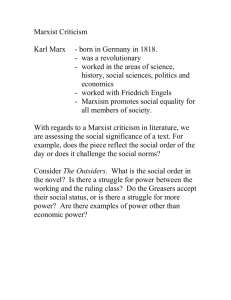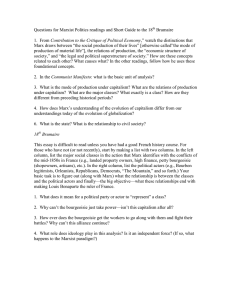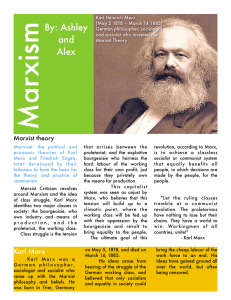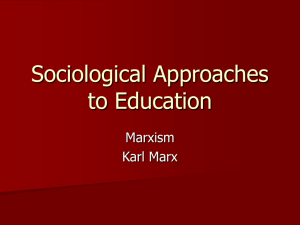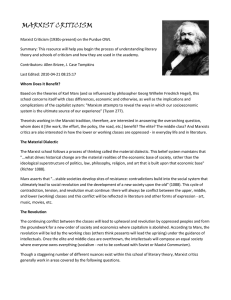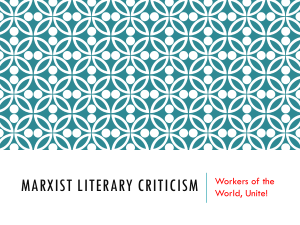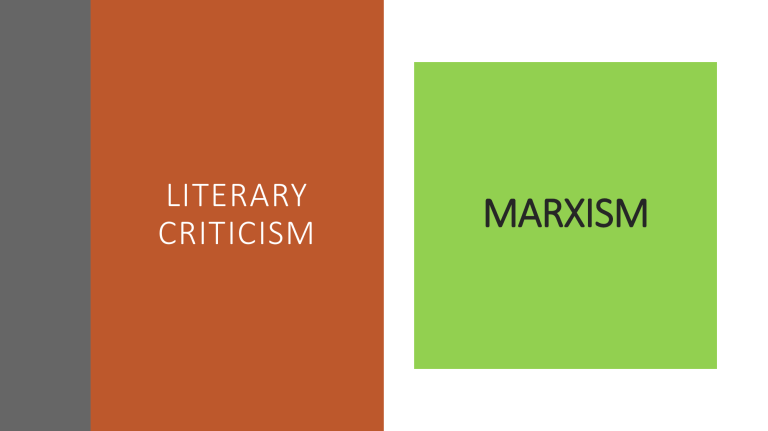
LITERARY CRITICISM MARXISM It is based on political an economic theories of Karl Marx. This approach considers the Human History as a series of struggles between social classes (between the oppresed and oppressing) Marxism Karl Marx is one of the most influential socialists thinkers of the 19Th Century. Some of his most notable work are: The German idiology (1846) And the Communist Manifesto (1848) Friederich Engles He was Marx´s best friend. He shared the Mark´s socialist beliefs and provided financial as well as intelectual support while Marx developed his theories. Some of his major Works are: The Condition of the Working Class in England (1844) Co-authored The Communist Manifesto (1848) Engels and Marx They founded the social and economic system of Marxism in the 19th Century, it is the opposite of the Capitalism. The Marxist Theory It argues that the way we think and experience our world are conditioned by the way the economy is organized, the material conditions control thoughts not vice versa. Bourgeoisie: The name given by Marx to the owners of the means of production in a society Definitions of some terms used in Marxist Works Idiology: A belief system Proletariat: the name given by Marx to the workers in a society Capitalism: Is an economic system that is based on the ownership of the means of production and the creation of goods and services for profit. Capitalism It is based on a private ownership and motivation by profit. Marx criticized capitalism for its tendency to abuse of working class or the proletariat, by paying a wage that barely guarantees the workers´survival. Marxist Idiology Marxism utilizes socialism concepts of public ownership. Marxism theorizes that in order to remove the proletariat from its poor economic situation, a socialist revolution must occur to remove the ruling class from the government. Marxism Criticism It promotes the idea that literature should be a tool in the revolutionary struggle. Marxcism ideology believes that the literature text has always a relationship with the society. It attemps to clarify the relationship of the literary work to the social reality. It judges literature by how it represents the main struggle for the power. It is foccused on matters such as: culture, social class, race and power. Analyzing a Marxist text Economic system is the moving force behind human History To explain any social context or genre it is necessary to understand the historical circumstances The conflict here is the friction between the proletariat and the bourgeoisie Marx asserted that reality is material not spiritual The higher class controls: art, literature and idiologies. Analyzing a Marxist text Marxist thought relies on relationships between individuals and how the characters interact Looks at the level of luxury that each individual has and how much of them have to work Looks how characters use their free time, the Marxist critique arguments that individuals can use free time productively Asses the role of government in the literature work What role does the social class play in the literary text? What is the author's analysis in the relations of social classes? What do Marxcist Critics ask? What does the literary text say about oppression and social conflicts? What is the economic status of the characters? What happen to them as a result of this status? What other conditions derived from the social class emphasizes the writer? In what other ways does the economic determinism affect the work and workers? What do Marxcist Critics ask? How Marxist literature can influence society and what repercussions it reflects in our time? How readers should consider this story in today´s developed or undeveloped world? What conflicts between the bourgeoisie and the proletariat are reflected in the literary text? End https://es.slideshare.net/ferdinandbulusan/marxist-criticism-presentation ttps://es.slideshare.net/aftabvoices/marxist-criticism-70346224
